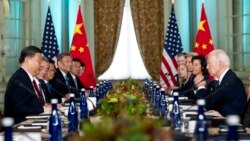The highly anticipated high-stakes meeting between US President Joe Biden and Chinese leader Xi Jinping took place on the sidelines of the Asia-Pacific Economic Cooperation summit.
Welcome to VOA Asia Weekly. I'm Chris Casquejo in San Francisco, site of the APEC meetings. That story is coming up, but first, making headlines:
A large crowd gathered Wednesday in front of the Chinese consulate in San Francisco to condemn Xi and marched toward the main APEC event venue. However, a large police presence and perimeter kept them blocks away from the site.
They held signs reading “Tibet belongs to Tibetans” and chanted “Free Tibet," referring to the Chinese Communist Party.
South Korean President Yoon Suk Yeol arrived in San Francisco on Wednesday to attend the APEC summit, seeking support from fellow leaders regarding the escalating military ties between North Korea and Russia. Yoon has criticized what he perceives as illegal cooperation between North Korea and Russia, describing it as a “serious threat.” However, both North Korea and Russia have denied engaging in any arms deals. This comes days after U.S. Defense Secretary Lloyd Austin attended a security meeting in Seoul.
Numerous members of the Myanmar security forces have either surrendered or been captured, according to rebel groups, with at least 28 policemen giving up their weapons and surrendering to the Arakan Army, while 10 soldiers were arrested.
Taiwan’s two primary opposition parties, the Kuomintang Party and the Taiwan People's Party, have announced a joint presidential ticket for January’s election. Although the parties didn't disclose specific collaboration details, they mentioned that their decisions would be guided by polling results. Both parties have been trailing in polls behind the frontrunner and current vice president, William Lai, the Democratic Progressive Party's candidate.
U.S. President Joe Biden met with Chinese President Xi Jinping on Wednesday outside of San Francisco, where leaders of Asia-Pacific economies are gathering. Biden – who said he still sees the Chinese leader as a “dictator” – said the two agreed to re-establish military communications, work together to assess the threats posed by artificial intelligence, and take meaningful steps to combat the scourge of fentanyl. VOA’s Anita Powell reports from Woodside, California.
A historic meeting of East and West, after 12 months of intense drama and diplomacy between Beijing and Washington.
The White House chose this venue outside of San Francisco for this symbolic visit, covering a range of key issues, including Taiwan – the self-governing island that China claims, the resumption of military communications, touchy trade disagreements, the origination of fentanyl ingredients in China, and human rights issues.
Biden said he was candid on those tough issues.
Xi said the two nations are inextricably linked.
“For two large countries like China and the United States, turning their back on each other is not an option. It is unrealistic for one side to remodel the other. ”
So did the presidents of the world’s two most powerful nations manage to paper over the cracks in their relationship?
Biden spoke to the press afterward. Xi, as is his habit, did not.
But, in response to a shouted question, he reiterated a stance that is likely to upset Beijing, that he believes Xi is a dictator.
“Well, look, he is. I mean he’s a dictator ... “
Many watching this meeting said they weren’t expecting major results but are glad the two are talking.
“This engagement, for example, between President Biden and Xi Jinping, to me it is critical because it should give a clear message that we are here to be able to work together and trust each other to resolve serious problems: climate, issues in Ukraine or Gaza..”
Analysts say the success of the summit of Asia-Pacific economies – happening simultaneously in San Francisco – depends on the world’s two largest economies getting along.
“Well, I think it’s an important meeting between President Biden and President Xi, with the primary goal of stabilizing the relationship heading into 2024. Being both for bilateral purposes but also very importantly for the broader APEC region. The countries there, the economies there, want the U.S. and China to have some kind of modus vivendi, some kind of stable relationship, particularly in anticipation of Taiwan’s election in January, the U.S. election in November.”
Biden said he and Xi will continue to communicate and cooperate. The world, he said, expects it.
Anita Powell, VOA News, Woodside, California.
Visit voanews.com for the most up-to-date stories.
I’m Chris Casquejo.
And now, a new trend is sweeping through Japan.
The trend of blessing dogs and cats in Japan during the traditional coming-of-age festival for children is catching on among pet owners as the nation grapples with a plummeting birth rate.
Thanks for watching VOA Asia Weekly.















